In Latin America, Migrants Face a Health ‘Emergency’
With support from The Church of Jesus Christ of Latter-day Saints, Project HOPE has scaled up its medical teams to address the migrant health crisis in Colombia, Ecuador, and Honduras.
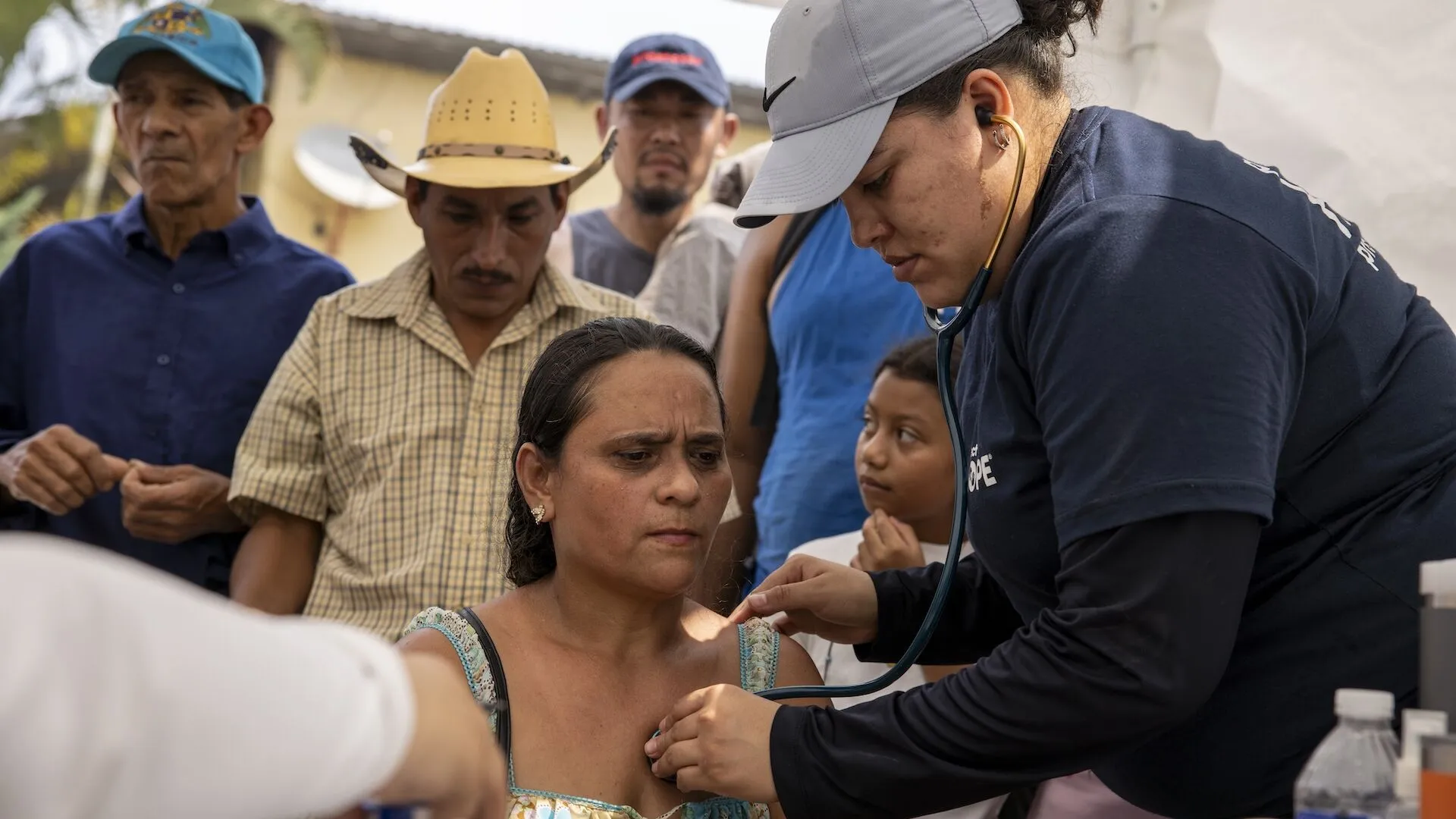
Manuel has 20 days to go.
Three months ago, he and seven others left their home in Caracas, Venezuela for the 1,400-mile journey to Ecuador. They didn’t want to leave. But they didn’t have a choice.
Venezuela’s instability and inflation had become too much of a burden: the minimum monthly income had dropped to just five dollars a month. A monthly distribution of food—including rice, pasta, and canned meat—lasted only four days. The chance to find stable, safe, meaningful work had become nearly impossible.
Like many migrants before them, Manuel and his group made much of their journey across Venezuela, Colombia, and Ecuador on foot. Some stretches were spent hitchhiking in the backs of trucks or on the occasional bus, when they could afford a ticket. But the trip—and the humanitarian crisis that precipitated it—has weighed especially heavily on Manuel, because he has made it with one leg.
In Ecuador, he hopes the sacrifice will pay off with what he says didn’t exist back home in Venezuela: the chance to work.
“There are eight of us walking, so we help each other out,” he says. “We give each other something, whether it be a small coin here or there. We give anything we can so we can eat. Sometimes we don’t have enough to eat or we don’t have enough to pay for a hotel. So we have to sleep on the street.”
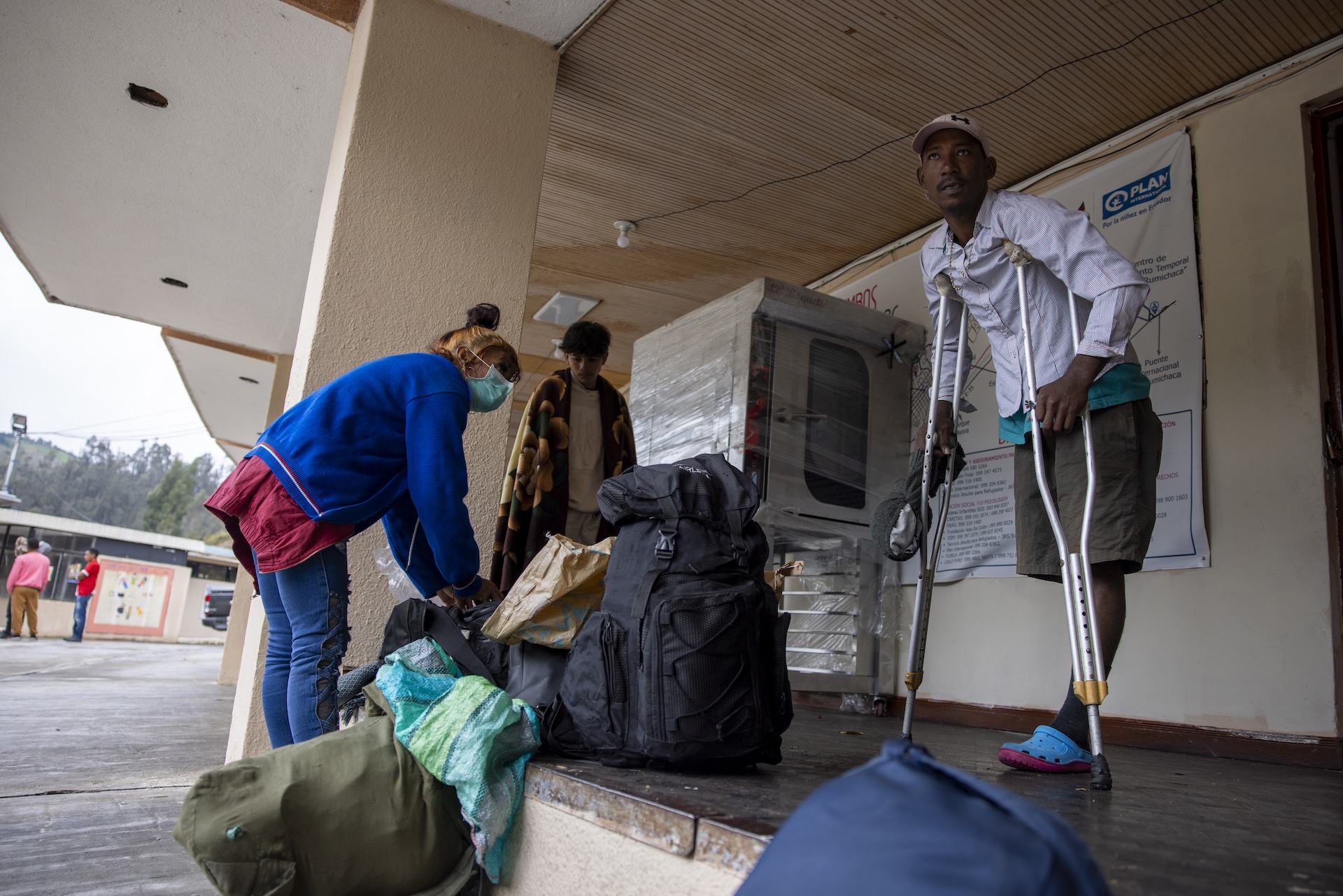
There are many factors driving migration. Many people are fleeing violence and conflict, humanitarian collapse, and the growing impacts of climate change and extreme weather. Millions like Manuel are fleeing political instability and increased violence that has led to complex humanitarian crises in countries such as Haiti, Venezuela, and Ecuador.
Many of those migrating are on their way to the U.S. border, where they will claim asylum due to violence or persecution in their home countries. Others plan to stop in Mexico or other countries along the way, where they hope to settle and work. Though many migrants are from Central and South American countries, there are also large numbers of people migrating from Africa, the Middle East, and Southeast Asia.
In Latin America and the Caribbean, 25 million people are projected to be forcibly displaced in 2024.
Many migrants face dangerous and treacherous routes as they look for a better tomorrow. Families can be divided, and sometimes young women and children are left doing the journey alone. In 2023, an estimated half a million migrants and refugees crossed the Darién Gap, a dangerous stretch of jungle terrain that connects Colombia with Central America.
Even when services are available, migrants often face barriers to accessing them, including cost, distance, lack of transportation, limited local health system capacity, lack of insurance or documentation, a limited awareness of available services, and fear or distrust of governments and health systems.
Given the heightened humanitarian needs, Project HOPE — through generous support from The Church of Jesus Christ of Latter-day Saints — has established programs in Colombia, Ecuador, and Honduras to meet the urgent health needs of migrants.
“Latin America and the Caribbean are experiencing the largest migration crisis in the world outside of conflict areas due to economic challenges; gangs and violence; and the impacts of climate change and extreme weather events on agriculture,” says Adib Fletcher, Project HOPE’s Senior Regional Director for Latin America and the Caribbean and humanitarian response. “Additionally, the collapse of public health systems in countries like Venezuela has driven people to seek health care in other countries.
“With support from The Church of Jesus Christ of Latter-day Saints, we are ensuring that individuals and families experiencing forced displacement can access basic health services and humanitarian aid.”
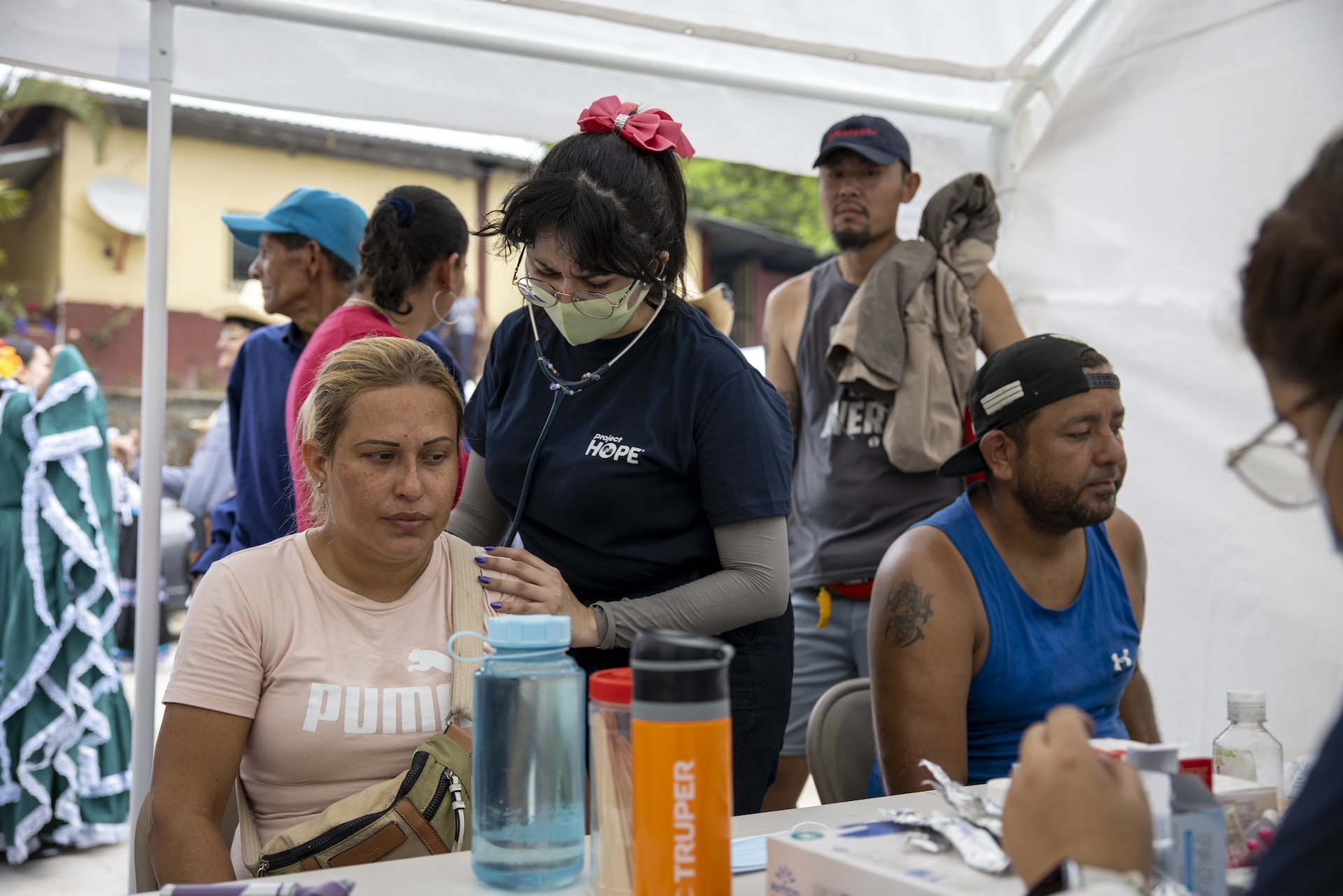
Colombia
Project HOPE has been providing humanitarian assistance to migrants, refugees, and host communities in Colombia since 2018. As part of this program, Project HOPE is now providing surge staffing at health facilities and a shelter to provide additional primary care services and psychological consultations. We’re also procuring pharmaceuticals, medical supplies, equipment, and hygiene, dignity, and birth kits for impacted communities. The program also includes community health promotion activities.
“Project HOPE’s support is currently centered in Norte de Santander in municipalities such as Cúcuta, Convención, and Villa del Rosario, the latter recognized to be one of the densest points for people in transit,” said Monica Hoyos, Project HOPE’s Program Director in Colombia. “One of the supported centers, Las Margaritas, had barely any resources or enough staff to provide attention to migrant population and wasn’t providing support. Now, at the Las Margaritas Comprehensive Center, different types of migrants from different places will arrive and be able to access psychology services, general medicine, primary health care, and medications.
“Project HOPE efforts will reduce the gaps in care, while maintaining the dignity of each person. Inclusiveness and quality in care and treatment are in the forefront of our work.”
Ecuador
Inside a temporary accommodation center near the Colombia border, Project HOPE’s medical team of doctors, nurses, and psychologists provides primary care services for migrants transiting through Ecuador. The most common medical conditions the team sees are dermatitis, gastrointestinal issues, lower body injuries, and dehydration. But one of the most urgent issues is mental health.
Marilyn, a Project HOPE psychologist, leads mental health sessions for migrants that focus on anxiety and depression, two of the most common mental health issues they face.
“[The biggest issue is] the uncertainty,” she says. “The majority of the people carry this uncertainty with them. For example, I am here at the shelter, but when this time is over, where am I going to go? Especially if they have children. What if it rains? What are we going to eat? Sometimes there are families that may have gone two days without eating, including their children.”

Project HOPE is also providing health facilities and shelters with pharmaceuticals, medical supplies, and equipment. We also installed hot water at the accommodation center near the border and are supporting referral pathways for protection services for survivors of gender-based violence.
“Often, populations in transit do not know how to access the spaces and services,” said Ramiro Proano, Project HOPE’s Country Representative for Ecuador. “Due to fear or lack of signage, they cannot reach the assistance points. Project HOPE has decided to go beyond formal spaces and approach transit points to provide health services in the resting spaces. This not only provides necessary support to these populations, but it relieves the pressure on health services and avoids overloading them when care can be offered in other spaces.”
Honduras
Project HOPE has worked in Honduras since 1983 addressing a range of issues, including maternal and child health, vaccination, HIV/AIDS, women’s rights, and health worker trainings. With hundreds of thousands of migrants transiting through Honduras, Project HOPE’s medical team is now providing surge support at health facilities, mobile medical units, and shelters. We’re also providing Psychological First Aid and training for health workers at key facilities and migrant transit points.
That support is vital for migrants like Michel*, who left the violence in Port-au-Prince, Haiti and journeyed from Chile up through South America, across the Darién Gap, and through Central America on his way to Mexico.
Michel is desperate to get his 2-year-old granddaughter out of the violence. For now, he can only send money back when he’s able to find work.
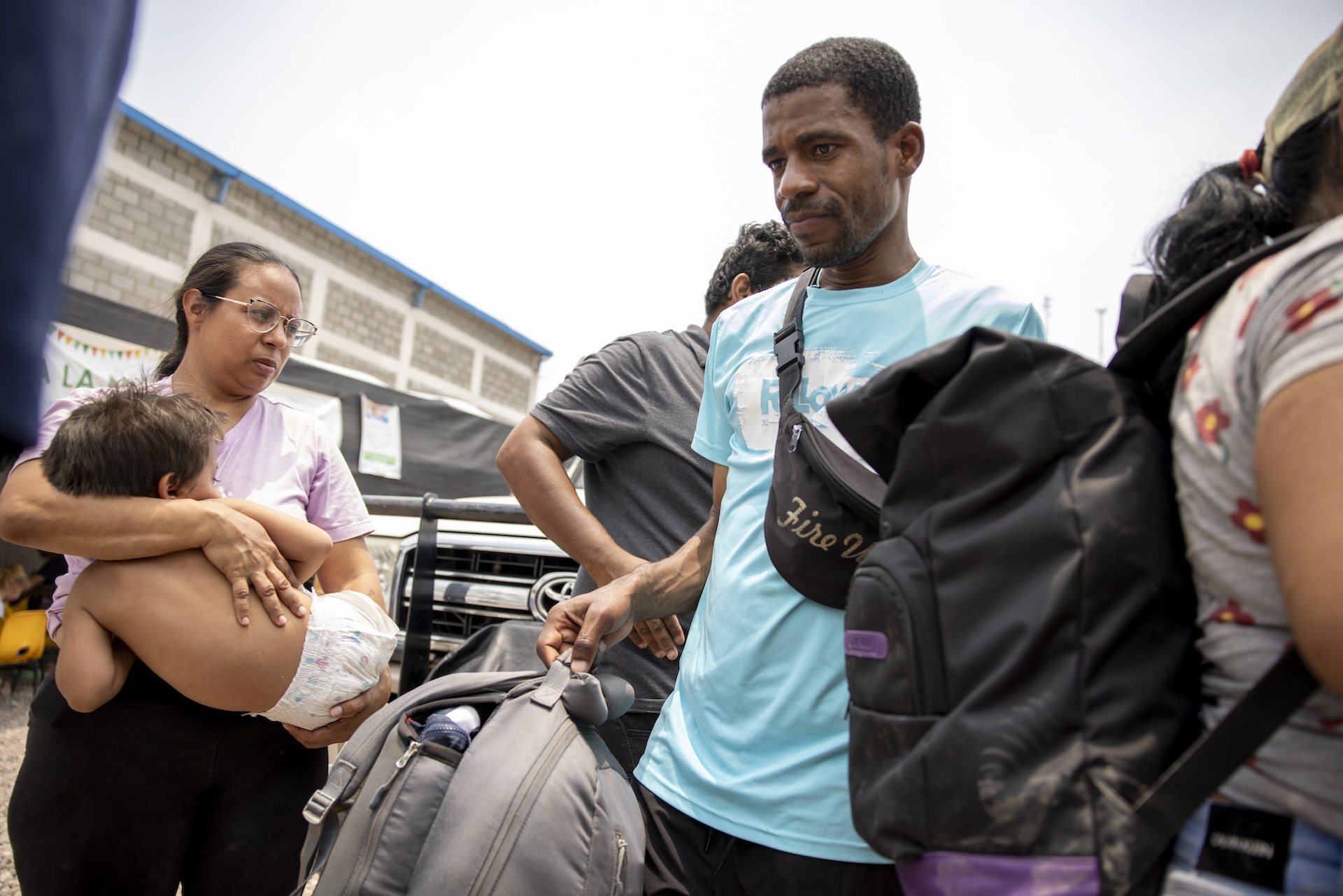
Dr. Angie Flores, who works for the local health ministry in Danlí, Honduras, said that the health situation for migrants in Honduras has become an “emergency,” especially as many of them take informal routes or avoid formal checkpoints where they could receive care.
“It’s an urgent health emergency,” Dr. Flores said. “[Project HOPE’s] work has been helpful, no doubt. It’s been a blessing. It’s helped with the primary care here a lot.”
The locations Project HOPE chose in Honduras support the large numbers of people in transit, said Project HOPE’s Honduras country representative Marco Antonio Suazo, but also local populations that have limited resources.
“The design of this program takes both realities into account,” Suazo said. “In this way we help with health, but we also open spaces so that local people do not feel that migration is a threat and can even collaborate in supporting people in transit in the difficult process of migrating instead of resenting them.”
Back in Ecuador, Manuel packs his belongings for the next leg of his journey: a bus that will take him and his group a few hours south. From there they will stop again, find something to eat, and rest for whatever is next to endure. In three weeks, they hope to be settled in Ecuador — somewhere safe, where there is work, where they no longer struggle for the necessities to survive.
“We continue to get places,” he says, “thank God.”
*Names have been changed.
Related Articles
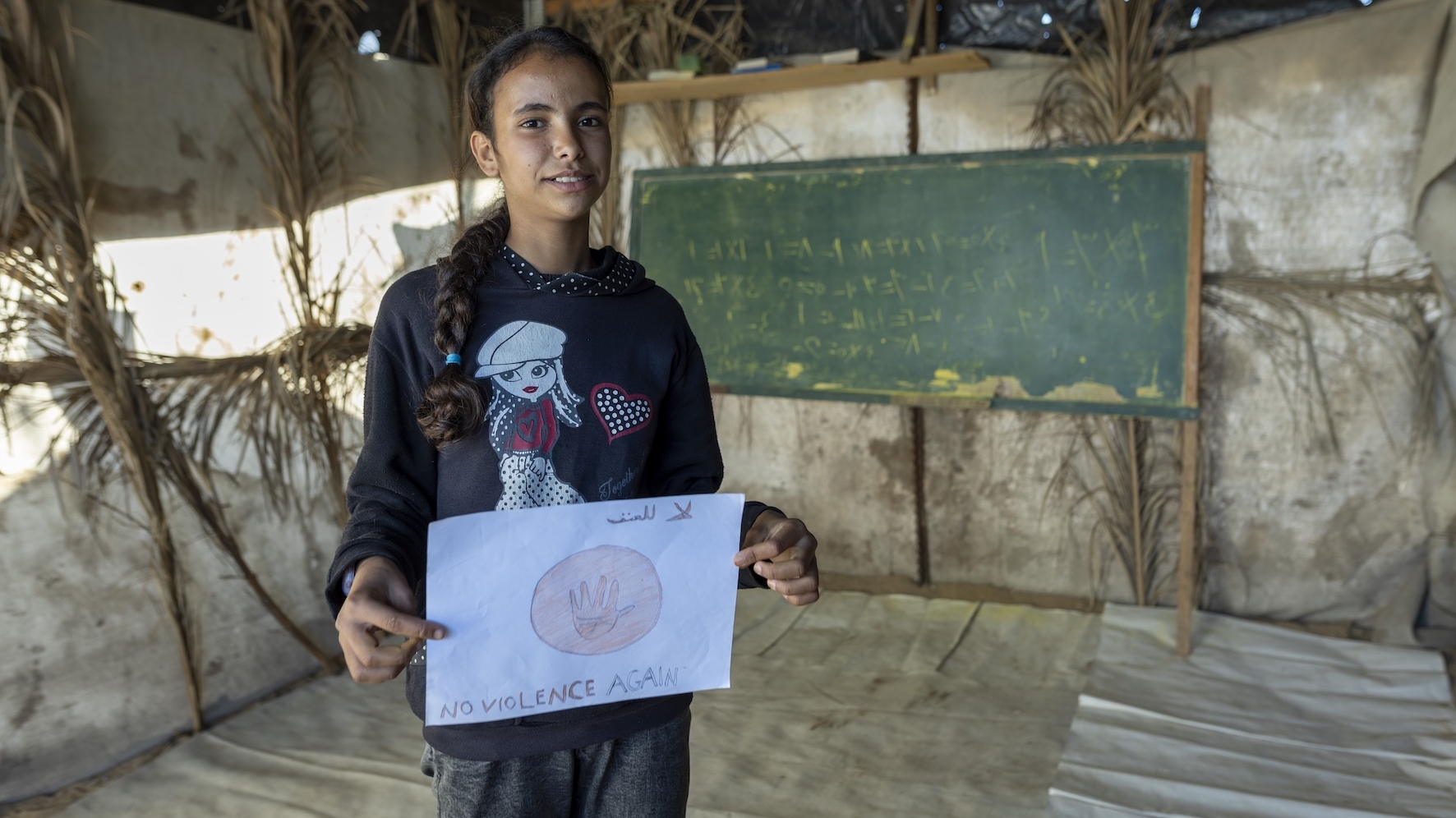
The Dreams of Gaza’s Children
04.01.2025

Myanmar Earthquake: How to Help
03.28.2025
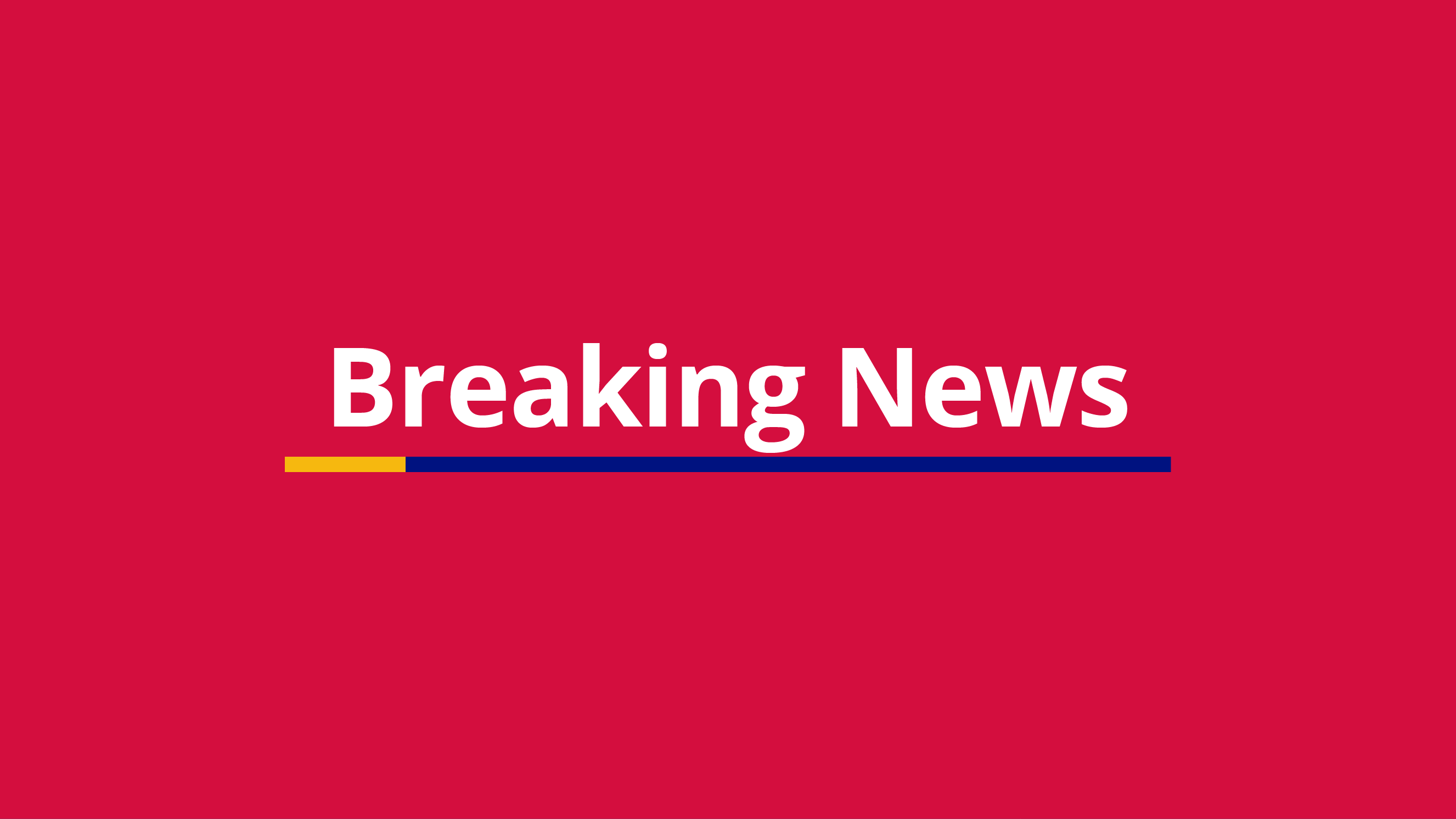
Myanmar Earthquake: Mobilizing a Response
03.28.2025
